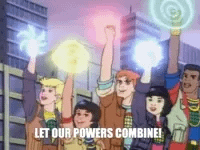No One Changes the World Alone
Why Collaboration is the Defining Skill and Strategy of Our Time
Hi y’all,
Quick two-question poll for you–
I posed these questions at the top of a webinar on collaboration last December. Over 50% of the respondents said they collaborated every day and another ~24% responded that they collaborated weekly. However over 90% responded that collaborating is effective but sometimes feels like it’s going in circles.
Collaboration is ever present in the work of systems change. And it is hard.
A 2024 Zoom roundup shared that, on average, 42% of office workers spend most of their time collaborating with others. A Gartner survey of 18,000 employees in early 2024 revealed that only 29% of them were satisfied with their collaboration at work.
If you’re a mission-driven leader, you’ve likely used this word before– you’ve written job descriptions calling for a colleague who can “actively partner and collaborate” with other leaders; you’ve coached your “matrixed” team on cross-org collaboration to meet this grant cycle’s impact goals; you’ve asked for collaboration from another org in that bimonthly coalition meeting.
Mission-driven spaces are filled with well-intentioned leaders who fervently want to make the world a better place. We believe the world can change. But we know that no one can change the world alone. And so, we come together in teams, organizations, coalitions, communities in order to do something that could not be done solo. We gather committed hearts and brilliant minds with every intention of creating a whole greater than the sum of its parts. And we quickly learn that collaboration requires more than good intention when faced with the hard work of systems change.
So What Is “Collaboration”?
Collaboration may be widely practiced in mission-driven spaces, but it is not very clearly defined.
The Oxford dictionary defines collaboration as “the act of working with another person or group of people to create or produce something.”
At Root + Bloom Strategies, we define collaboration for systems change as “coming together on purpose, for a purpose.”
Collaboration is coming together on purpose, for a purpose.
Like the concept it describes, this definition is deceptively simple. Coming together “on purpose” is about gathering intentionally, yes, but it is also about being thoughtful about who is in the room, why they’re there, and the type of infrastructure that supports their consistent presence.
Coming together “for a purpose” is about the why, the overarching goal, the guiding vision that everyone is working to make real. But it is also about the what, about the active contributions that make participation meaningful. Each collaborator is in the room because they have a part to play that is important and purposeful.
Skill and Strategy
Collaboration is a necessary skill and strategy for impactful systems change. In theory, collaboration is as simple as the kindergarten-level act of “playing well with others.” In practice, however, it is an advanced and complex leadership competency that can make the difference between doing actual good or just… doing stuff.
Let’s break it down.
First, collaboration is a skill. It is an ability that can be taught, practiced, and strengthened. It is often dismissed as a “soft” skill, with the implication that it doesn’t take a lot of technical expertise to grasp nor a lot of nuance to apply. There’s a whole other essay on that coming. For now, I’ll say to this audience of professionals that anyone who has done this work knows that the “soft” skills are the hard skills.
Further, collaboration is a strategy. It is a lens through which a plan of action can be designed to achieve a goal. It is a strategy many of us use on a daily basis– in that recurring coffee chat with our counterpart on a different team, that cross-functional team meeting, that task force listserv. It is a strategy that recognizes the power of joining forces to expand capacity, better understand connected pieces of the puzzle, and focus collective energy in the right place at the right time.
Collaboration is how mission driven leaders make a meaningful impact.
The Defining Skill and Strategy of Our Time
All systems change work is intertwined. Though we may approach our work as separate, siloed disciplines, it’s all connected– child care to the workforce, climate change to public health, AI to education, equity and liberation to everything.
The problems we’re trying to solve are connected; so too must be the solutions. COVID revealed a lot of that interconnectedness, as cracks in our systems deepened into fault lines during a time of crisis. In the half decade since, it has become increasingly clear that the impact we seek requires that we break down silos and collaborate across sectors.
But collaboration is hard.
Collaboration is hard, largely because it’s unpracticed. It’s not what a lot of us are used to. Rather, we approach systemic issues with specialized lenses that don’t allow us to see the full picture. We compete for resources–including time, money, and attention– and advocate as if we’re playing a zero-sum game. We glorify limited cuts of data, unable to capture much of the human nuance that factors heavily into any system.
And, when we’re most honest about it, as leaders we have a hard time setting aside our egos for the sake of the collective. We want to be right and we want others to admit it.
To date, collaboration for systems change has largely existed within the paradigm of winning. Sometimes we collaborate effectively, and sometimes it feels like we’re just going in circles. But we are in an era of increasing complexity, rapid transformation, and escalating uncertainty. We don’t have time to go in circles.
Collaboration is the defining skill and strategy of our time. It allows us to move beyond winning individually to thriving collectively.
Like any skill or strategy, collaboration must be practiced. In future essays, I’ll share a framework for collaborating for systems change, along with resources that help my clients deepen their own collaboration skills and strategies.
For now, I’ll prompt you to reflect– what would it really take for you (or your team, your org) to collaborate effectively? What impact could you create?
Remember, the world can change, but no one can change the world alone.
Let’s move from silos to ecosystems,
Nia



